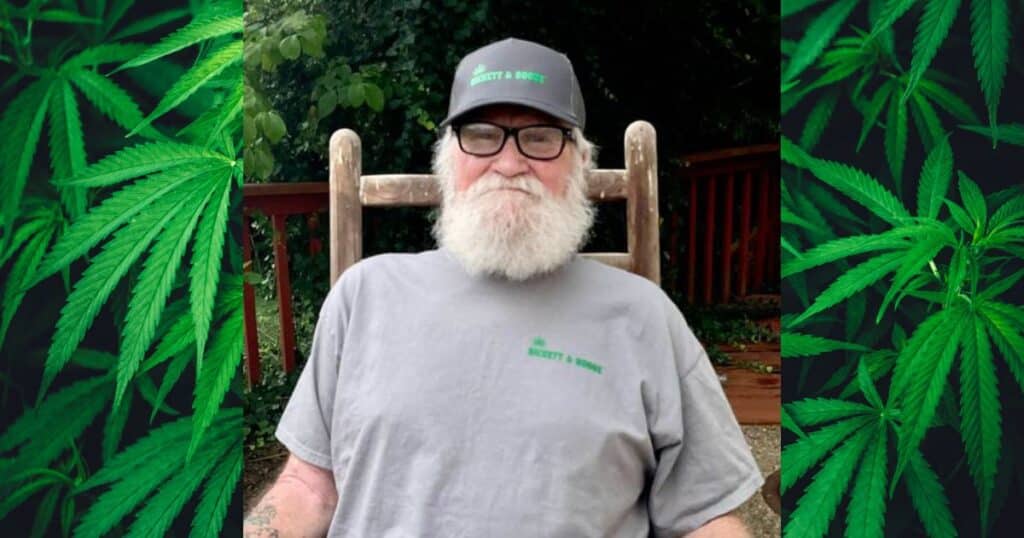Johnny Boone, a name synonymous with the legendary “Cornbread Mafia,” passed away at the age of 80 last Friday. Known as the “Godfather of Grass,” Boone was a prominent figure in what federal prosecutors in 1989 dubbed the largest domestic marijuana production syndicate in American history.
Today, as recreational cannabis is now legal across almost half of the United States, Boone’s life story serves as a reminder of how far the cannabis industry has come—and how much further it has to go.
The Early Days of Johnny Boone and the Cornbread Mafia
Boone’s passing was revealed in a Facebook post by Joe Keith Bickett, the author of the Cornbread Mafia book series and a fellow Cornbread Mafia member.
“He was a great friend to many of us,” Bickett wrote. “Always willing to help his friends and neighbors. Prayers and thoughts for all the Boone family. He will be greatly missed.
Born and raised in Central Kentucky, Johnny Boone became an iconic figure in the cannabis world long before it was mainstream. Along with his close-knit group of associates, Boone cultivated vast amounts of marijuana across Marion, Nelson, and Washington counties during the 1970s and 1980s. This small operation soon expanded to more than ten states, making Boone and his crew household names in the underground world of cannabis.
In 1987, federal agencies arrested Boone and dozens of his associates, beginning an eight-year federal manhunt that would cement Boone’s legendary status.
Despite the substantial number of arrests, the authorities faced significant challenges in breaking the Cornbread Mafia’s “code of silence.” Not a single member flipped, a testament to the loyalty within the group.
“Godfather of Grass”
Johnny Boone wasn’t just a criminal in the eyes of the law; he was a folk hero to many. His nickname, the “Godfather of Grass,” reflects his larger-than-life persona and his pivotal role in the cannabis community.
Unlike violent criminals, Boone and his associates were artisans of their craft, committed to providing quality marijuana at a time when it was far from being socially acceptable.
One of the most colossal marijuana busts in American history involved Boone’s operations. In October 1987, law enforcement seized 47 tons of marijuana from a Minnesota farm, where Boone was leading operations.
This bust led to Boone’s 20-year sentence, a harsh punishment for a non-violent crime that many today see in a different light given the changing legal landscape around cannabis.
Boone’s story took another dramatic turn in 2008 when state police and the DEA raided his Springfield farm and discovered 2,400 marijuana plants. To avoid a life sentence under the “three-strikes” rule, Boone fled the country, evading capture for eight years.
In 2016, authorities captured Boone in Montreal, bringing his run to an end. He pleaded guilty to one charge and received a 57-month prison sentence.
However, in 2020, Boone received early release due to a COVID-19 outbreak at his federal prison in Ohio. It was a bittersweet victory as Boone returned to a world where cannabis was steadily gaining acceptance and legality.
Beyond his notoriety, Boone was also known for his generosity and willingness to help friends and neighbors. This goodwill further solidified his standing in the community, making it difficult for authorities to gain any ground against him. His death marks the end of an era, but his spirit and legacy will continue to influence the cannabis community for years to come.
Changing Landscape of Cannabis
Johnny Boone’s life and legacy highlight the dramatic shift in societal attitudes towards cannabis. Today, nearly half of all states have legalized recreational marijuana, a stark contrast to when authorities hunted and imprisoned Boone and the Cornbread mafia for involvement in the cannabis trade.
Boone’s story reminds us of the thousands who faced severe penalties for activities that are now perfectly legal in many parts of the country.
The Cornbread Mafia remains a significant chapter in the history of American cannabis. Boone and his associates were pioneers in their own right, laying the groundwork for the legal cannabis market we see today. Their story is a mix of defiance, resilience, and an unyielding belief in the plant’s potential benefits.

For cannabis culture enthusiasts, Johnny Boone’s life story is both a cautionary tale and an inspiration. It underscores the importance of fighting for what you believe in, even when the odds are stacked against you. Boone’s resilience and dedication to the plant serve as an example for those who continue to advocate for cannabis legalization and normalization.
With cannabis becoming increasingly accepted, it’s worth reflecting on the past struggles and ongoing challenges within the industry. Boone’s life serves as a stark reminder of the progress made and the work still needed to ensure that cannabis is accessible, affordable, and free from the stigma that once surrounded it.
Looking ahead, Boone’s legacy will likely continue to influence cannabis legislation and the broader movement for criminal justice reform. As more states move towards legalization, the story of Johnny Boone and the Cornbread Mafia will serve as a historical touchstone, reminding us of the sacrifices made and the resilience required to bring about change.
















